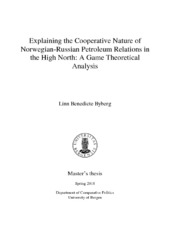Explaining the Cooperative Nature of Norwegian-Russian Petroleum Relations in the High North: A Game Theoretical Analysis
Master thesis
Permanent lenke
https://hdl.handle.net/1956/18774Utgivelsesdato
2018-06-20Metadata
Vis full innførselSamlinger
Sammendrag
In this thesis, I consider the following research question: Why have Norwegian-Russian petroleum relations in the High North remained cooperative? Petroleum cooperation between these two states in the High North has not always been straight-forward and predictable. However, cooperation within this area and in this region has been more stable and successful than general foreign- and security policy cooperation between Norway and Russia. Furthermore, cooperation between Norway and Russia has been more successful than cooperation between Russia and the West more generally. It is this paradox that provides the main puzzle for my thesis. In this game theoretical analysis, I seek answers to my research question by employing two separate hypotheses. These hypotheses are then tested via the Varangerfjord Agreement of 1957, the Grey Zone Agreement of 1978 and the Delimitation Agreement of 2010. These agreements have been chosen because they are three of the most documented examples of negotiations taking place between Norway and Russia in the High North. They also represent the resolution of a delimitation dispute over time. Furthermore, the signing of the Delimitation Agreement of 2010 came as a surprise to many, and it is therefore worthwhile to scrutinize why this dispute was solved at this particular time and which factors helped facilitate this successful outcome. Any negotiation may have an outcome ranging from total disagreement, on the one hand, to complete agreement, on the other hand, and different degrees of ambiguity in between. Further, there are several side-effects of the process leading to the settlement that has nothing to do with the agreement between the two states, but rather deal with third parties, international publicity, and so on (Iklé 1964: 59). Had I attempted to combine all these heterogeneous factors, the negotiating process would have seamlessly intertwined with the field of international relations. However, such an approach is not possible. It is therefore essential to focus only on the question of why the particular negotiation process lead to the agreement under investigation. Following this method, I find that a combination of mutual interests in the region and petroleum interdependence help make this relationship cooperative.
